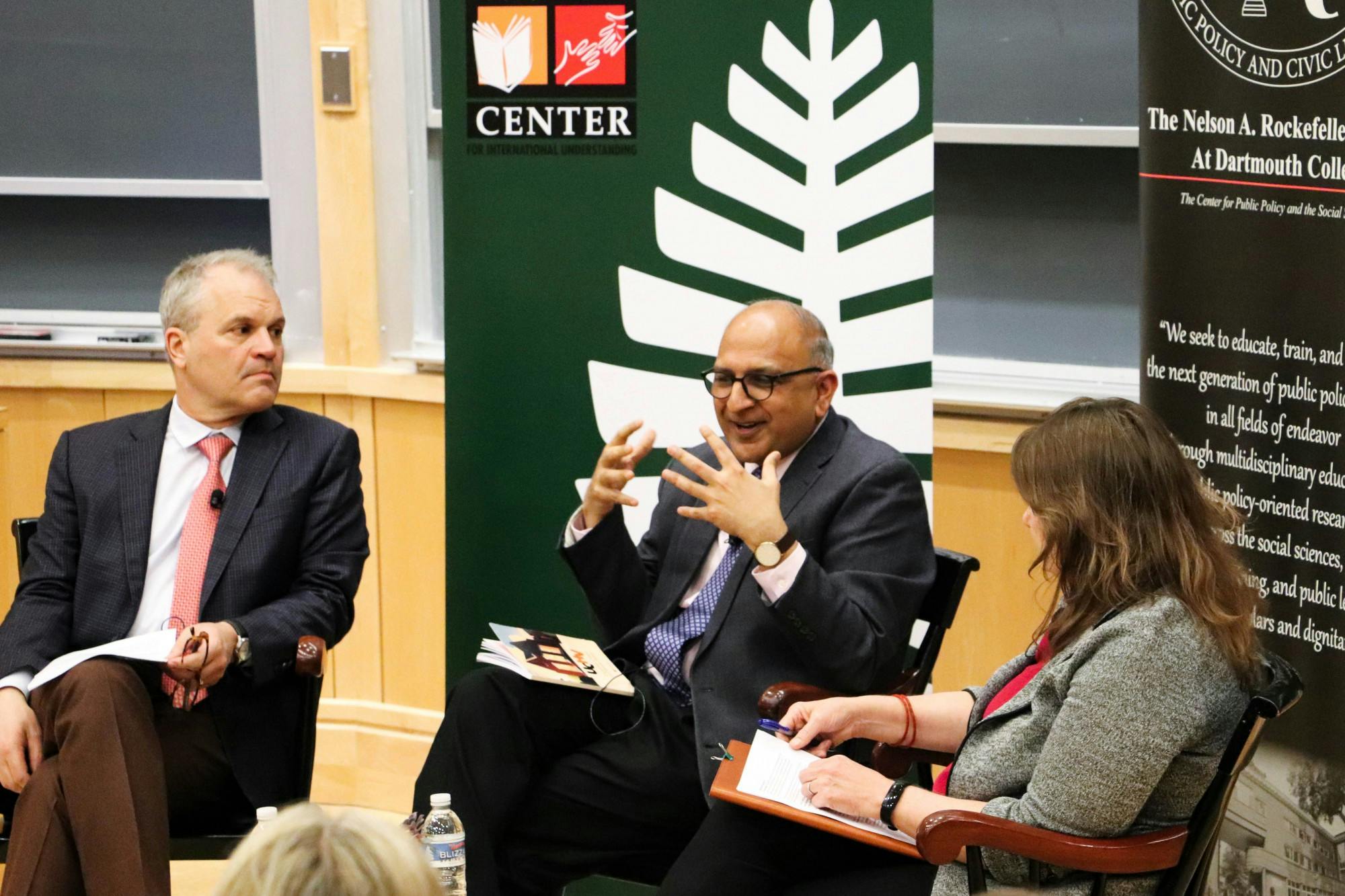On April 6, government professor Russ Muirhead and the Dickey Center for International Understanding director Victoria Holt moderated a conversation with political scientist Pratap Mehta to discuss recent democratic backsliding, or the deterioration of democracy, in India. The event — co-sponsored by the Dartmouth Political Union, Dickey Center, Political Economy Project and Rockefeller Center for Public Policy — marked the second talk in a collaborative series collectively referred to as the Democracy Summit, according to the DPU’s website.
The student-run Democracy Summit includes lectures and debates on the endurance of democracy domestically and internationally, according to the DPU website. Iranian-American journalist and women’s rights activist Masih Alinejad spoke at its inaugural event on Feb. 13.
Mehta is currently teaching at Princeton University as a Laurance S. Rockefeller Professor for Distinguished Teaching. He previously served as the former vice chancellor and co-founder of Ashoka University in Delhi, India, where he faced pressure to abandon his position due his outspoken dissent against the undemocratic, repressive policies of Indian Prime Minister Narendra Modi’s government, according to the event description.
When Mehta received a letter from Ashoka calling him a political liability, he felt “pressured to protect the university by leaving it,” Muirhead said in his introductory remarks.
“[Mehta is] a critic of the Modi regime and a defender of pluralistic India, rather than an India that is ruled in the name of a Hindu religious majority,” Muirhead said.
While Mehta described Modi’s ascent to power as legitimate and democratic, he said he regards the regime as “deeply authoritarian” and “majoritarian” — espousing a rule of law that amounts to nothing more than “state-sanctioned vigilantism,” in which individuals are empowered by the state’s ideology to carry out violence. He added that the government’s “single aim is to consolidate India’s identity as a Hindu nation.”
According to Mehta, Modi’s government has embraced institutionalized violence, weaponized the rule of law and limited freedom of speech to consolidate its power and establish a Hindu rhetoric across the secular country.
“The checks and balances we assumed existed in the Indian institutional structure have more or less collapsed,” Mehta said during the event. “[Modi’s government] seeks to control information order in the broadest sense of the term … and has been quite spectacularly successful at it, ... increasing [the] use of state power to target opposition leaders and journalists.”
Jahnavi Sodhi ’24, who attended the event, said that the lack of democracy in India affects her as an Indian citizen.
“The political climate in India right now is very intolerant,” Sodhi said. “I really admire people who can speak out against what’s happening in India right now.”
In response to a question about how best to counter democratic erosion, Mehta said that the United States should not involve itself in the democratic affairs of other nations.
“The last thing you want to do is to make democracy an instrument of geostrategy, which is what inevitably happens whenever the [United States] gets involved,” Mehta said. “We’re at a moment in world politics where the credibility and authority of U.S. democracy has been at its lowest.”
Mehta added that Modi’s government relies on the idea that the West and foreign powers intend to harm India, which serves as a “catalyst” for its defensive posture.
According to Mehta, democratic erosion is now a worldwide phenomenon seen in other nations like Brazil, Hungary and the United States.
“It’s remarkable how trends, especially regarding democracy, emerge simultaneously worldwide,” Mehta said. “A lot of trends towards democratic backsliding were exacerbated by the 2009 financial crisis. We underestimate the political effects of that crisis.”
In addition, the audience asked if other factors contributed to democratic backsliding, such as the rise of China, and also inquired about the possibility of large-scale mass violence in India and the freedom of the Indian Supreme Court.
“Any democracy that looks to the courts to save its democracy has already lost the plot,” Mehta said. “It is elite, wishful thinking.”
Political Economy Project director Henry Clark credited Muirhead with the ideation and execution of the “thought-provoking” event, since “democracy is on everyone’s mind.”




